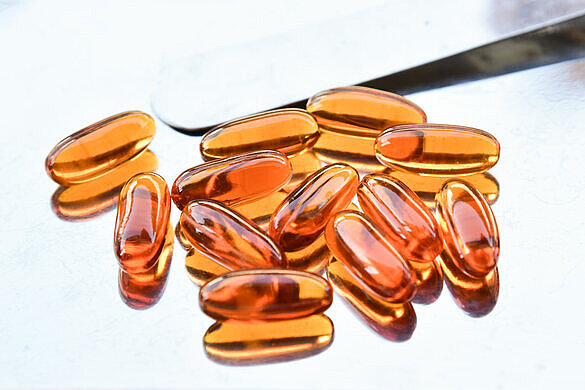Emulsifiers

But what effect do emulsifiers have on dogs? Are they harmful or beneficial to the health of our four-legged friends? In this article, you can find out more about the function, advantages and disadvantages of emulsifiers for dogs.
How do emulsifiers work?
Emulsifiers consist of molecules that are both water-loving and fat-loving. This means that they can combine with both water and oil. As a result, they form a kind of bridge between the two liquids and stabilize the mixture. This mixture is called an emulsion.
There are different types of emulsifiers, which have different properties depending on their origin and structure. Examples of emulsifiers are lecithin, mono- and diglycerides of fatty acids, polysorbate 80 and gum arabic.
What are the benefits of emulsifiers for dogs?
Emulsifiers can have a number of benefits for dogs, depending on which product they are contained in. For example, they can extend the shelf life of food by inhibiting the growth of bacteria. They can also improve the texture and taste of food by giving it a creamy or foamy consistency.
Emulsifiers can also promote the absorption of nutrients by facilitating digestion. For example, they can improve fat digestion by breaking down fats into smaller particles. They can also increase the bioavailability of vitamins by improving their solubility.
What are the disadvantages of emulsifiers for dogs?
Emulsifiers can also have disadvantages for dogs, especially if they are consumed in too large quantities or too frequently. For example, they can cause digestive disorders such as diarrhea, flatulence or vomiting. They can also disrupt the intestinal flora by disturbing the balance between beneficial and harmful bacteria in the gut.
Emulsifiers can also trigger allergic reactions if the dog is sensitive or intolerant to a particular emulsifier. This can manifest itself in skin rashes, itching or breathing difficulties. In addition, some emulsifiers can increase the risk of chronic diseases such as inflammation, obesity or diabetes.
Emulsifiers are substances that can mix two or more liquids together. They are often used in food and other products to improve their quality and shelf life. Emulsifiers can have both advantages and disadvantages for dogs, depending on how much and how often they are consumed. It is therefore important to always read the product label and be aware of possible side effects.
If you notice any signs of hypersensitivity or poisoning in your dog, you should see your vet immediately. We are not a substitute for a vet, but we try to be as accurate as possible. Every dog reacts differently and we recommend you get a second opinion or consult your vet if in doubt.
Stay healthy and take good care of your four-legged friend!😊
Similar to Emulsifiers
Lecithin is a collective term for various phospholipids that play an important role in the cell membrane. Phospholipids are fat molecules that consist of a water-soluble head and a fat-soluble tail....
Edible fatty acids are fats that are obtained from vegetable or animal oils. They are also known as hydrogenated or partially hydrogenated fats because they are modified by a chemical process called...
Polysorbates are chemical compounds that act as emulsifiers. They make it possible to mix substances that are normally difficult or impossible to combine, such as oil and water. Their use ranges...
Sorbitan esters are chemical compounds that result from the reaction of sorbitol and fatty acids. Sorbitol itself is a sugar alcohol that occurs naturally in many fruits, but can also be produced...



